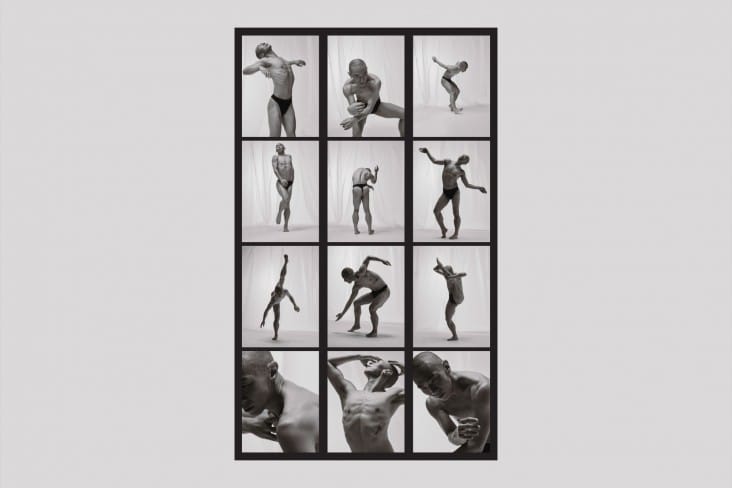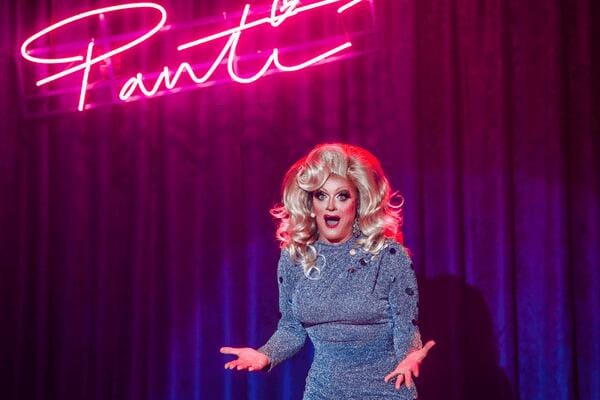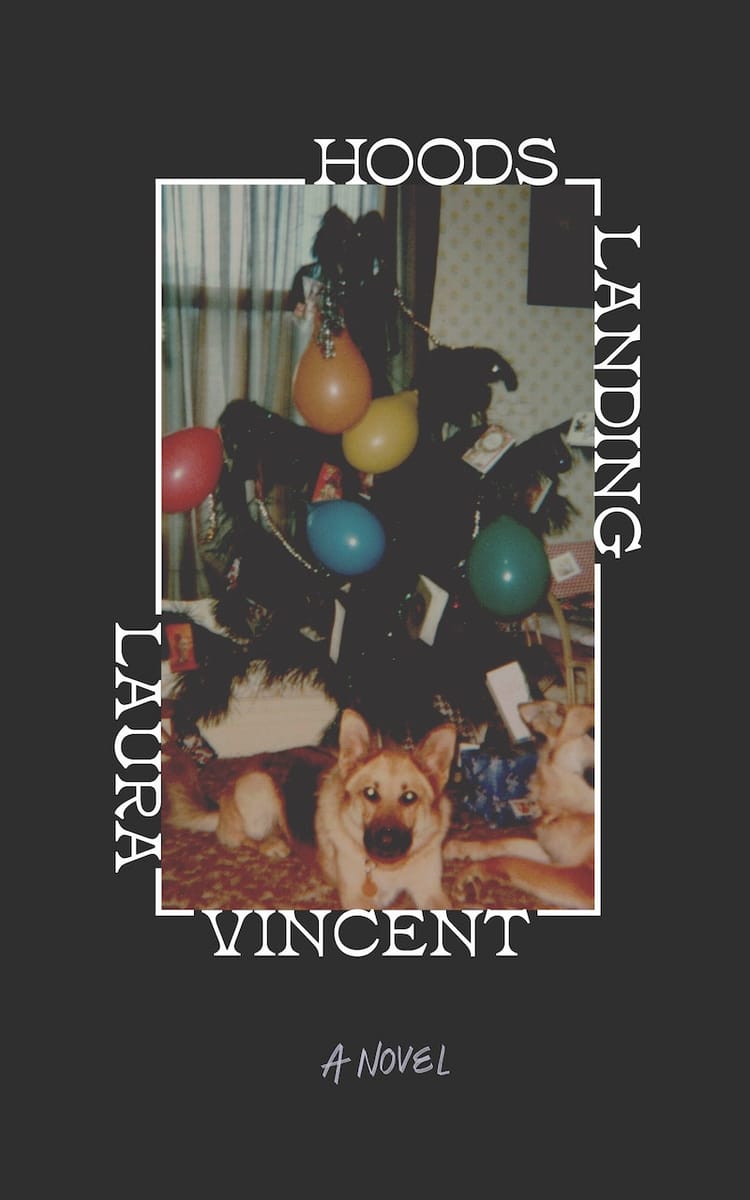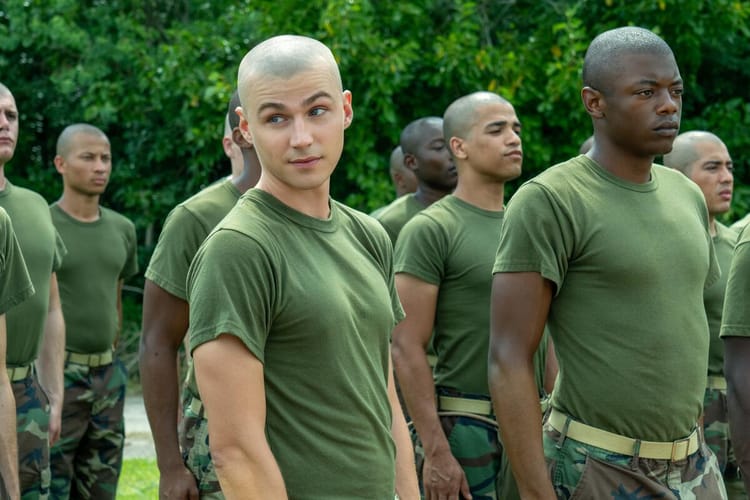Critical Corner: Star Gazers, Body Story, Panti Bliss

Reviewing dance stresses me out. It’s an artform I understand purely as an audience member, and a little bit as a theatremaker, whenever there may be crossover with that form, and honestly pretty much every form of live performance crosses over a bit with theatre. Therefore, my responses tend to come from an emotive place rather than one of authority. Read with that in mind!
In saying all that: the opening of Body Story, the debut solo work from dance artist Xin Ji, is something that even the uninitiated can tell is excellent. He moves around jerkily, yet elegantly, in a massive silver coat (designed by Steven Junil-Park, truly the MVP of any show fortunate enough to have him) as Alistair Deverick’s thumping music plays. While this happens, Ji’s voice booms over – “The successful body, the authoritarian body, the sweaty body” ad nauseam. Essentially, framing everything a body can do, and can be. That’s the thing about frames though, every frame is as much exclusion as it is inclusion.
This also sets the frame for the show, as Xin Ji discards the coat and proceeds to show us, and apologies for the roteness of this phrase, what his body can do. There’s a massive pleasure in watching a dancer do the thing they’re extremely good at, so it makes sense to make it the point of a show. It’s also, not to put to fine a point of it, a great showcase of how design can support, and elevate, a body, and full credit to lighting designer Rowan Pierce, set designer Talia Pua and AV designers Qianye and Qianhe Lin.
However, the middle part of the show falls a bit flat, a long segment where Ji’s performance is replaced with a voice-over on his past training in China. The material is interesting, but unfortunately the text falls flat, as does the vocal performance. I could be convinced that the tension here is intentional; at the limitations of words and verbal language to define a history, when we can see the effects of Xin Ji’s life and training in his physical performance, but the flatness is so jarring that it is disconnecting rather than enlightening.
While it never quite reaches the heights of that opening, Body Story is at its best when it leans into the first part of that title; more body than story. Xin Ji’s performance is thrilling, enlivening, and difficult to look away from (although there’s plenty else gorgeous to look at onstage).

Every now and then you read a book and you realise that you could recommend it to pretty much anybody. This isn’t necessarily a sign of quality - Tomorrow, Tomorrow and Tomorrow is a book that I could recommend to pretty much anybody but would recommend to nobody because I think it's a very bad book - but in the case of Duncan Sarkies’ Star Gazers, it absolutely is. A political thriller (and occasional satire) set in the competitive world of alpaca breeding, it’s also a commentary on the intersections of power, greed, and insecurity.
I can’t speak to the accuracy with which Sarkies depicts the alpaca breeding community, but he absolutely nails the ways that people, especially those in insular, inward-facing, groups form their own power structures. The plot, as with many of these things, is a bit of a MacGuffin – a stuffed ballot box for an election, corporate corruption, scape-alpacas aplenty – but where Sarkies really shines is his character work. (It goes without saying that Sarkies’ prose has much the same quality as his playwriting; witty, incisive, with the occasional leap into the lyrical.)
With the exception of a TikTok scrolling Gen Z character, which feels a little bit too flat to read as either an authentic depiction or scathing satire, Sarkies’ populates his books with a cast that is deeply understandable. From the influence-gobbling, power-mad Shona to the tired, weary Daphne, Sarkies gets inside his character’s heads beautifully.
Nowhere is this more tragic than Caroline, who finds herself under Shona’s thrall when things inevitably go south. An otherwise normal person, I can see Caroline being any of the aunts I see while doomscrolling FB, the kind of person who posts “I do not give Meta permission to use any of my images” and the like. In a gorgeous late moment, we get a snapshot of inside her head when she does a thing that is pretty objectively unhinged: “Everything I do is good. Everything I have done is good. I am bold. I am strong. I am smart. I am a winner.”
We know these people. We see them in news stories, very rarely the headline, but somewhere in the photos. The kinds of people who have one gap in their armour - the feeling that something isn’t quite right in the world - that is ruthlessly exploited by people for their own gain. Sarkies depicts these people both as victims and players in their own demise. He also, brilliantly, wisely, shows the impact that these power struggles have on the truly helpless: the animals that belong to their community.
Star Gazers is a brilliant read, one that I imagine will be showing up in book clubs, inside bundles of frantically wrapped paper, and on hold lists throughout the country. This time, I mean it as a hearty recommendation.

As with seeing an experienced dancer work at the height of their abilities, there are few pleasures like being held in thrall by an experienced drag queen. In If These Wigs Could Talk, drag queen, activist, author, and overall multi-hyphenate Panti Bliss holds the audience in the palm of her manicured, and I’m sure moisturized, hand for 75 minutes. There’s very few bells and whistles here, Panti Bliss is the star.
It’s more storytelling than show, but that’s exactly what we need right now. Although a fair bit of Bliss’ show is entertaining stories - including a wild weekend in Vienna - the bulk of it is a reminder that drag is political, queer art is political, and sometimes just being onstage and being queer is in itself an activist. (This makes the show sound like a stone cold bummer, but it’s absolutely not. Bliss controls tone as though she literally has her hand on the dial; laugh here, cry here, reflect on your queer trauma here.)
Ultimately, it’s the perfect blend of sobering and enlightening. At some point she says, about the kinds of people who have being making headlines for all the worst reasons, that their goal is “to make humanity smaller”. With this show, Bliss reminds us of how big it can be, and simply continuing to exist - in defiance, in joy, in whatever we might wake up feeling that day - makes humanity bigger.
Other Things I’ve Consumed
Nothing! I’m rehearsing a show y’all (see below).
Self-Promo
- If you’re in Tāmaki, my new show From Another Woman opens on February 27! You can read more and book tickets here.
- Also, if you’re in Tāmaki and want to learn playwriting from me specifically, there’s still a few slots for my PEP writing course that starts in March! You can find more details here.
- Finally, if you’ve got a kid and want them to do cool performance-related things during the April holidays, can I recommend checking out the National Youth Drama School? A bunch of amazing people are teaching, and I am also teaching (playwriting!).
Writing and reporting takes time, and if you want to support the amount of time it takes (and ensure that the scant amount of meaningful coverage of local art can continue), please considering supporting Dramatic Pause with a paid subscription ($8 p/m, $60 p/a) and if you can't afford a paid subscription, please share the work with your networks!





Member discussion